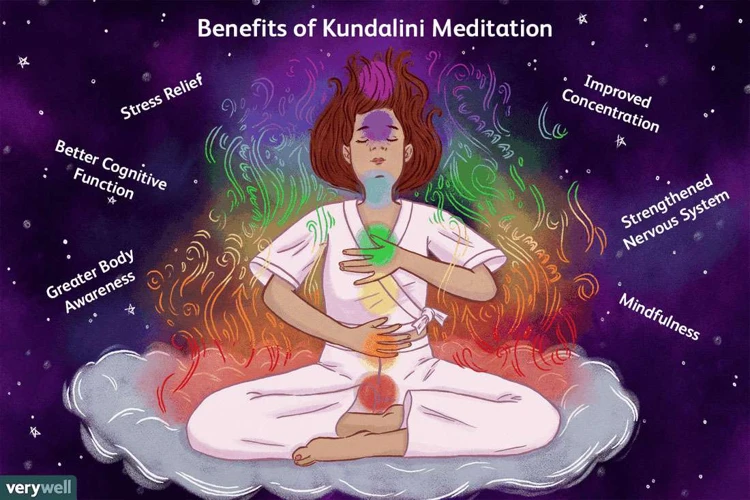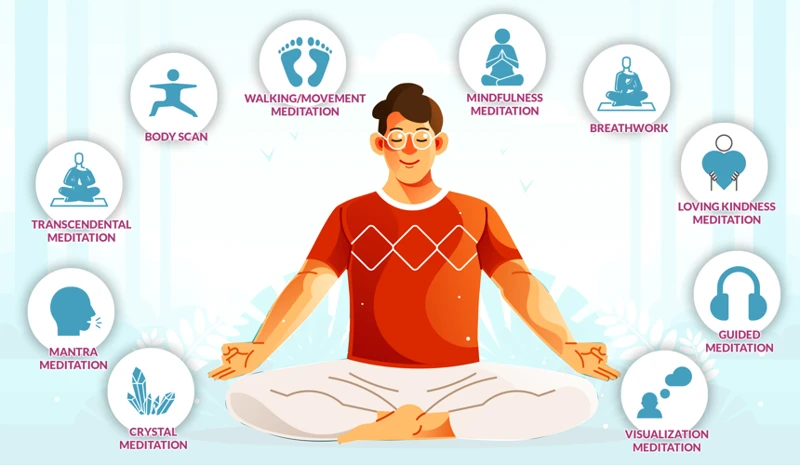As human beings, we often find ourselves searching for answers to life’s big questions. We seek a deeper understanding of our existence and purpose. In this pursuit, many turn towards spiritual practices such as meditation. Mantra meditation is a specific type of meditation that has been practiced for centuries and is gaining popularity in the Western world. Along with its established benefits for mental and physical health, many practitioners claim that it can lead to spiritual awakening. But what exactly is spiritual awakening, and how does mantra meditation help us achieve it? In this article, we will explore the connection between mantra meditation and spiritual awakening, delve into the benefits of both practices, and provide practical tips for incorporating them into our daily lives.
What is Mantra Meditation?

As we delve into the world of spirituality and self-discovery, it’s important to explore different practices that can help us reach a state of inner peace and awareness. One such practice is mantra meditation, which involves the repetition of a word or phrase to help focus the mind and attain a state of deep relaxation. In this section, we will explore the definition of mantra meditation, its benefits, and how it is connected to spiritual awakening. If you’re new to mantra meditation, we recommend checking out our mantra meditation techniques for beginners guide or explore mantras right for you to gain further insights into the practice.
The Definition of Mantra Meditation
Mantra meditation has been practiced for thousands of years in various spiritual and religious traditions. The word ‘mantra’ comes from the Sanskrit language, where ‘man’ means ‘mind’ and ‘tra’ means ‘vehicle’ or ‘instrument.’ Mantras are therefore thought of as tools or instruments of the mind, used to focus and calm the thoughts and emotions (source).
Mantra meditation involves repeating a word, phrase, or sound (the mantra), either silently or aloud, with the intention of bringing the mind into a state of concentration and relaxation. The mantra is often repeated in rhythm with the breath, which can enhance its calming effects (source).
One of the key benefits of mantra meditation is that it can help to quiet the constant chatter of the mind, allowing for a deeper sense of inner peace and stillness. By focusing on the sound of the mantra, the mind becomes less distracted by other thoughts and feelings, creating a sense of calm (source).
Studies have shown that mantra meditation can have a positive impact on the brain, reducing stress and anxiety and increasing feelings of well-being and happiness. This is thought to be due, in part, to the effects of the repetitive sound on the brain’s neural pathways (source).
In essence, mantra meditation is a powerful tool for cultivating greater focus, relaxation, and inner peace. By incorporating this practice into your daily routine, you may experience a range of physical and psychological benefits, from reduced stress and anxiety to improved mood and overall well-being (source).
The Benefits of Mantra Meditation
Mantra meditation has several benefits that make it an effective tool for achieving spiritual awakening. Let’s take a closer look at these benefits in the table below:
| Benefits of Mantra Meditation |
|---|
| Reduces stress and anxiety |
| Improves concentration and focus |
| Increases self-awareness and mindfulness |
| Enhances emotional well-being |
| Strengthens the immune system |
| Helps with insomnia and other sleep disorders |
Reducing stress and anxiety: One of the most notable benefits of mantra meditation is its ability to reduce stress and anxiety. By repeating a mantra, you can focus your mind and relax your body, which helps to reduce overall stress levels.
Improving concentration and focus: Mantra meditation helps improve concentration and focus by providing a point of focus. As you repeat the mantra, you concentrate on the sound and vibration of the words, which allows you to tune out distractions and focus on the present moment.
Increasing self-awareness and mindfulness: Mantra meditation also helps to increase self-awareness and mindfulness. By using a mantra to anchor your thoughts, you become more aware of your thoughts and feelings as they arise. This awareness can help you better understand yourself and your emotions.
Enhancing emotional well-being: Regular mantra meditation can lead to enhanced emotional well-being. It can help you feel more relaxed and peaceful and promote a general sense of contentment.
Strengthening the immune system: Studies have shown that regular practice of meditation, including mantra meditation, can help strengthen the immune system. This can lead to a decreased risk of illness and disease.
Helping with insomnia and other sleep disorders: Mantra meditation can also be helpful in treating insomnia and other sleep disorders. By focusing the mind and promoting relaxation, it can help you fall asleep and stay asleep more easily.
Mantra meditation has numerous benefits that can help you achieve spiritual awakening. If you’re interested in exploring mantras that are right for you, check out our article on how to explore mantras that are right for you.
What is Spiritual Awakening?

The search for a deeper meaning in life is a universal human need. It’s a desire to experience something beyond our physical existence and to connect with a higher power. This quest led to the conception of spiritual awakening, a process of profound realization of the self and the universe. Spiritual Awakening is a state of being that goes beyond the physical realm and is a culmination of one’s personal evolution.\ But what exactly is spiritual awakening, and what does it entail?
The Definition of Spiritual Awakening
Spiritual awakening is a profound shift in an individual’s consciousness and perception of the world around them. It is a realization of the interconnectedness of all things and a deeper understanding of one’s place in the universe. This shift can be sparked by a variety of factors, such as a traumatic life event, a spiritual practice, or a deep sense of internal reflection.
Key Features of Spiritual Awakening
| 1. Expanded Awareness | The individual begins to perceive the world beyond their immediate surroundings and becomes increasingly aware of the interconnectedness of all things. |
| 2. Inner Transformation | There is a profound shift in the individual’s internal world, marked by a sense of inner peace, clarity, and purpose. |
| 3. Heightened Empathy | The individual becomes more attuned to the emotions and experiences of others, leading to a greater sense of compassion and understanding. |
| 4. Sense of Purpose | With the realization of their place in the universe, the individual gains a sense of clarity and purpose in their life’s path. |
| 5. Connection to Something Greater | There is a sense of deep connection to something greater than oneself, whether it be a higher power, the universe, or humanity as a whole. |
It is important to note that spiritual awakening is a deeply personal experience and can differ greatly from person to person. While the above features are commonly reported, not every individual will experience all of them, and some may experience additional features not listed here.
The Role of Mantra Meditation in Spiritual Awakening
Mantra meditation is one practice that can assist in fostering spiritual awakening. By focusing the mind on a particular word or phrase, one is able to quiet the mind and open themselves up to new levels of consciousness. This quieting of the mind can allow for a deeper understanding of oneself and the world around them, leading to a greater sense of interconnectedness and empathy.
Mantra meditation can help to break down the ego, which can be a hindrance to spiritual growth. By focusing on something greater than the self, the individual is able to let go of their attachment to their own identity and move towards a more universal understanding of the world. This can lead to a profound sense of inner peace and clarity, as well as a deeper connection to something greater than oneself.
The Signs of Spiritual Awakening
As one embarks on the journey towards spiritual awakening, there are certain signs that may start to show. These signs may vary in intensity from person to person, but they all signify growth and development in one’s journey. Here are some of the most commonly reported signs of spiritual awakening:
| Signs of Spiritual Awakening | Description |
|---|---|
| Increased intuition | One may start to experience a stronger sense of intuition or inner knowing. This can manifest in various ways, such as increased feelings of certainty or confidence in decision making. |
| Heightened empathy | As one becomes more spiritually awake, they may start to feel more deeply connected to others and experience heightened levels of empathy. This can lead to a greater sense of compassion and understanding towards others. |
| Increased sense of purpose | As one becomes more spiritually aware, they may start to feel a stronger sense of purpose or direction in life. This can lead to a greater sense of motivation and drive to pursue one’s passions and dreams. |
| Heightened sense of awareness | As one becomes more spiritually awake, they may start to notice things that they previously ignored or took for granted. This can include a greater appreciation for nature, a deeper understanding of one’s own emotions, and a heightened awareness of synchronicities or signs from the universe. |
| Feelings of inner peace | As one becomes more spiritually aware, they may start to experience a greater sense of inner peace and calmness. This can lead to a reduction in stress and anxiety and an overall increase in well-being. |
| Increased sense of connection | As one becomes more spiritually awake, they may start to feel a greater sense of connection to others and to the universe as a whole. This can lead to a greater sense of unity and oneness. |
It is important to note that these signs do not necessarily all appear at once, and some may be more prominent than others. However, they all point towards a greater sense of spiritual awareness and can serve as an indication that one is on the right path towards awakening.
The Connection between Mantra Meditation and Spiritual Awakening

Many spiritual practices involve some form of meditation, and mantra meditation is a technique that has been used for thousands of years to help individuals achieve a state of inner peace and balance. However, beyond simply calming the mind, there is a deeper connection between mantra meditation and spiritual awakening. By repeating a specific phrase or sound, practitioners can transcend their thoughts and emotions and connect with their inner consciousness. This connection can ultimately lead to spiritual awakening, a profound transformation that encompasses a broader understanding of oneself and the world around us. Let’s explore the powerful connection between mantra meditation and spiritual awakening in more detail.
The Use of Mantras in Spirituality
Mantras have been used for centuries as a tool for spiritual growth and connection. In spirituality, a mantra is a sacred word or phrase that is repeated continuously, allowing the practitioner to focus their mind and connect with their inner self. Mantras are often associated with certain deities, and their repetition is believed to invite the energy of that deity into the meditation space.
Mantras are not just confined to the practice of meditation. They are also used in various devotional practices, such as chanting, singing, and reciting. In these practices, mantras are repeated to evoke feelings of devotion, gratitude, and surrender to a higher power.
There are countless mantras that are used in various spiritual traditions, and each one is believed to have unique benefits. Some mantras are used for spiritual healing, while others are used to enhance intuition, increase focus and concentration, or promote inner peace.
In addition to their spiritual benefits, mantras can also have a profound impact on the mind and body. Studies have shown that the repetition of mantras can reduce stress and anxiety, lower blood pressure, and improve overall well-being.
The use of mantras in spirituality is a powerful tool for spiritual growth and connection. Through their repetition, we can access deeper levels of consciousness and connect with the divine energy that resides within us all.
How Mantra Meditation Leads to Spiritual Awakening
Mantra meditation has been used for centuries as a spiritual practice for achieving a state of heightened awareness and enlightenment. By using a repeated word or phrase, known as a mantra, as a focus for meditation, practitioners are able to quiet their minds and awaken their inner selves. But how exactly does this process lead to spiritual awakening? Let’s explore.
| Inward Focus | Mantra meditation allows for a shift in focus from external stimuli to internal awareness. This inward focus helps individuals become less distracted by their surroundings and more in tune with their inner selves. |
| Reduced Stress and Anxiety | Mantra meditation has been shown to reduce levels of the stress hormone cortisol, which can help individuals feel more relaxed and peaceful. By reducing anxiety and stress, individuals are better able to connect with their spiritual selves. |
| Heightened Energy | By focusing their energy on the repetition of a mantra, practitioners can tap into a heightened state of consciousness. This increased energy can help individuals become more in tune with their spirituality and gain a deeper understanding of themselves and the world around them. |
| Expanded Awareness | Through the use of mantra meditation, individuals can open their minds to new experiences and perspectives. By releasing their attachment to limiting beliefs and thoughts, practitioners can gain a broader awareness of the universe and their place within it. |
| Connection to Higher Power | For many, mantra meditation serves as a connection to a higher power or spiritual force. By focusing their thoughts and energy on a sacred or divine mantra, individuals can feel a sense of unity with something larger than themselves. |
The practice of mantra meditation allows for a deeper connection to the spiritual self, and can help practitioners achieve a state of spiritual awakening. By quieting the mind, reducing stress, and opening up to new perspectives, individuals are able to connect with a higher power and gain a greater understanding of their place in the universe.
How to Practice Mantra Meditation for Spiritual Awakening

Embarking on a spiritual awakening journey through mantra meditation can be both exciting and daunting. It is normal to wonder where to start and how to practice mantra meditation. This part of the article will provide practical tips on how to choose the right mantra and effectively practice mantra meditation for spiritual awakening. By following these guidelines, you can begin to harness the power of mantras to awaken your spirit and deepen your inner peace and understanding.
Choosing the Right Mantra
When it comes to mantra meditation, choosing the right mantra is crucial for a successful practice. A mantra is a word, sound, or phrase repeated during meditation to help focus the mind and evoke a particular state of being. There are a variety of mantras to choose from, but it’s important to find one that resonates with you and your intentions for your practice. Here are some factors to consider when choosing a mantra:
| Factor | Considerations |
|---|---|
| Intentions | What do you hope to achieve through mantra meditation? Are you seeking inner peace, spiritual growth, or stress relief? |
| Tradition | Are you drawn to a particular spiritual or meditation tradition that uses mantras? Examples include Hinduism, Buddhism, or Kundalini yoga. |
| Sounds | Do certain sounds resonate with you more than others? Some mantras are based on specific sounds or syllables, such as Om or Ah. |
| Length | Consider the length of the mantra. Short mantras, such as Om or So Hum, can be easier to focus on and repeat for an extended period of time. |
| Personal Connection | Ultimately, the right mantra for you is one that feels meaningful and personal. Listen to your intuition and choose a mantra that resonates with your heart and soul. |
It’s important to note that there is no one “right” mantra for everyone. Experiment with different options and see which one feels most effective for your practice. Once you have chosen a mantra, stick with it for a period of time to fully experience its benefits.
Practicing Mantra Meditation
When practicing mantra meditation, it is important to find a quiet and comfortable place where you can sit for an extended period of time. Here are the steps to follow for practicing mantra meditation:
| Step | Description |
|---|---|
| 1 | Choose a mantra: Choose a mantra that resonates with you and that you can repeat easily. It can be a word or phrase that holds spiritual significance to you or simply a sound that feels soothing. |
| 2 | Sit in a comfortable position: Choose a comfortable seated position that allows you to maintain good posture. This could be on a cushion on the floor with your legs crossed or on a chair with your feet firmly on the ground. |
| 3 | Close your eyes and relax: Take a few deep breaths and settle into a state of relaxation. Release any tension in your body and allow your mind to quiet down. |
| 4 | Repeat the mantra: Begin repeating the mantra either out loud or silently in your mind. Try to synchronize the repetition of the mantra with your breath. If your mind wanders, gently bring it back to the repetition of the mantra. |
| 5 | Continue for a set period of time: Continue repeating the mantra for a set period of time, such as 10-20 minutes. It is normal for your mind to wander during this time, but try to remain focused on the repetition of the mantra. |
| 6 | End the practice: After the allotted time has passed, slowly and gently bring your attention back to your surroundings. Take a few deep breaths and open your eyes. |
Practicing mantra meditation regularly can help you to quiet your mind, reduce stress, and allow for greater spiritual connection and awakening. However, it is important to remember that this is a practice and that it takes time and consistency to see the full benefits.
The Benefits of Spiritual Awakening

As one embarks on the path towards spiritual awakening through practices like mantra meditation, they can experience a multitude of benefits that promote a deeper sense of connection with themselves and the world around them. These benefits are not only physical, but also mental and emotional, leading to a greater sense of inner peace, empathy, and awareness. Let’s explore some of the positive aspects that can accompany the journey towards spiritual awakening.
Inner Peace and Calm
Inner peace and calm are some of the most significant benefits of spiritual awakening that one can experience. Through a regular practice of mantra meditation, one can begin to tap into a deeper sense of inner peace and calm that is not easily disturbed by the ups and downs of daily life. This sense of peace and calm is not only a state of mind but can also be experienced on a physical level.
One study found that regular meditation practices, such as mantra meditation, can reduce stress and anxiety levels by activating the parasympathetic nervous system, which is responsible for the body’s rest and relaxation response. This activation can help reduce the levels of the stress hormone cortisol in the body, leading to a sense of relaxation and calm.
Regular mantra meditation practice can help to regulate breathing patterns, leading to a greater sense of calm and relaxation. The deep breathing techniques used in mantra meditation can help to slow down the heart rate and lower blood pressure, which can have a profound effect on the body and mind.
The benefits of inner peace and calm that come from practicing mantra meditation and experiencing spiritual awakening cannot be overstated. They provide a solid foundation for navigating life’s challenges and living with greater ease, joy, and fulfillment.
Table: Benefits of Inner Peace and Calm
| Benefit | Description |
| Reduced Stress and Anxiety | Mantra meditation can activate the parasympathetic nervous system, leading to a reduction in cortisol levels and lower stress and anxiety levels. |
| Regulated Breathing | The breathing techniques used in mantra meditation can help regulate breathing patterns, slowing down the heart rate and lowering blood pressure. |
| Greater Sense of Relaxation | Regular practice of mantra meditation can lead to a deep sense of relaxation and inner calm, providing a solid foundation for navigating life’s challenges. |
Incorporating mantra meditation and spiritual awakening into your daily life can help you experience these benefits and more. Through a consistent practice and dedication to your spiritual path, you can cultivate deep inner peace and calm that will support you through life’s challenges and bring greater joy and fulfillment to your life.
Greater Empathy and Connection
One of the benefits of spiritual awakening is the development of greater empathy and connection, both with oneself and with others. As we become more aware of our own emotions and experiences, we are better able to understand and relate to others. This can lead to deeper and more meaningful connections in our relationships, as well as a greater understanding and acceptance of those around us.
Developing empathy also allows us to experience a greater sense of compassion towards others, and to become more selfless in our interactions. When we are able to put ourselves in someone else’s shoes, we are more likely to act in a way that is considerate and kind.
Spiritual awakening can also bring about a sense of connection to the universe or a higher power. Many people report feeling a deeper sense of purpose and belonging, and a stronger connection to the world around them. This can lead to a greater sense of fulfillment and contentment in life, as well as a willingness to contribute to the greater good.
Developing empathy and connection through spiritual awakening can greatly improve our relationships and our sense of purpose in the world.
Increased Awareness and Understanding
One of the key benefits of spiritual awakening is the increased awareness and understanding that comes with it. This is an enhanced understanding of yourself, others, and the world around you. It can lead to a deeper understanding of the interconnectedness of all things and a greater appreciation for the beauty of the universe.
Through mantra meditation and spiritual awakening, you may find yourself becoming more mindful and fully present in your daily life. You may start to notice details that you may have otherwise overlooked, and become more attuned to your senses. This can lead to a greater appreciation for the simple things in life and a deeper sense of gratitude.
Additionally, as you become more aware of your own thoughts and emotions, you may start to develop a greater sense of empathy and understanding for others. It can help you to connect more deeply with those around you, leading to stronger and more meaningful relationships.
Spiritual awakening can also bring about a deepened understanding of the nature of reality and the universe as a whole. You may start to question your preconceived notions and beliefs, leading to personal and intellectual growth.
The increased awareness and understanding that comes with spiritual awakening can lead to a more fulfilling and meaningful life, rich with new insights and experiences.
Practical Tips for Incorporating Mantra Meditation and Spiritual Awakening into your Daily Life

Incorporating mantra meditation and spiritual awakening into your daily life can be a wonderful way to promote inner peace and personal growth. Here are some practical tips to help you achieve this goal:
1. Create a Dedicated Space: Find a quiet and peaceful space in your home where you can regularly practice mantra meditation. Make it a space that feels special and sacred to you.
2. Set a Consistent Schedule: Consistency is key when it comes to mantra meditation and spiritual awakening. Aim to practice at the same time every day so that it becomes a natural part of your routine.
3. Commit to Regular Practice: In order to receive the full benefits of mantra meditation and spiritual awakening, it is important to make a commitment to regular practice. Even just a few minutes a day can make a significant difference.
4. Incorporate Mantras into Your Daily Life: You don’t have to limit mantra meditation to your dedicated space. Consider incorporating mantras into your daily life by silently repeating them as you go about your day.
5. Practice Mindfulness: Mindfulness is a key component of spiritual awakening. Be present in each moment, and try to approach each experience with an open and curious mind.
6. Be Open to Change: Spiritual awakening is a journey, and it often involves a great deal of personal growth and transformation. Embrace the experience and be open to the changes that may come.
7. Seek Out Guidance: If you are struggling with your practice or have questions about spiritual awakening, seek out guidance from a trusted source such as a teacher or mentor.
Remember, the path to spiritual awakening is a personal one, and what works for one person may not work for another. It is important to find a practice that resonates with you and to approach your journey with an open mind and an open heart.
The Importance of a Consistent Practice

A consistent practice is crucial for both mantra meditation and spiritual awakening. Without consistency, the mind may struggle to learn new habits and maintain a positive focus.
Why Consistency is Important
Consistent practice allows the mind to become more attuned to the present moment, helping to quiet the distractions and chatter that may dominate our thoughts. It creates a sense of routine and familiarity that can deepen the connection between mantra practice and spiritual awakening. When practiced regularly, mantra meditation can become an effortless and natural part of daily life, supporting our spiritual growth through the ups and downs of everyday challenges.
Additionally, a consistent practice helps to build momentum towards our goals of spiritual growth and self-discovery. This momentum is created by the daily progress that we make through consistent practice, no matter how small it may be.
How to Incorporate Consistent Practice
To incorporate consistent practice into your daily life, it can be helpful to establish a routine. This routine should include a set time and place for your mantra meditation practice. This will help to create a sacred space where you can focus solely on your practice, and ultimately deepen your connection to the present moment, helping to cultivate a more profound spiritual awareness.
It may also be helpful to set intentions, goals, or reminders to practice each day. This can be done through a journal or planner, or by simply setting reminders on your phone. This will reinforce the importance of your practice, and help you to stay committed to your spiritual journey.
Ultimately, consistency and commitment to your practice will create a foundation for spiritual awakening that will extend beyond just mantra meditation. A consistent practice will lay the groundwork for long-term spiritual growth and well-being, helping to nurture inner peace, balance, and fulfillment in all aspects of life.
Challenges You May Encounter on the Path to Spiritual Awakening
As with any journey towards personal growth, the path to spiritual awakening is not without its challenges. It is important to remember that setbacks and obstacles are a natural part of the process, and that with time and consistency, they can be overcome. In this section, we will explore some of the common challenges that individuals may encounter on their path to spiritual awakening, and offer practical tips for how to navigate them. Let’s dive into the complexity of the journey towards spiritual enlightenment.
Frustration and Impatience
When embarking on the path of spiritual awakening through mantra meditation, it is normal to encounter some challenges. One of the most common obstacles is frustration and impatience. It is important to remember that spiritual growth is a journey that requires patience, discipline, and commitment. Below are some tips for dealing with frustration and impatience on your path to spiritual awakening:
1. Acceptance
Acknowledge that frustration and impatience are natural reactions when progress is slow. However, instead of resisting or denying these emotions, it is important to accept them and practice self-compassion. Be gentle with yourself as you navigate these emotions and try to approach them with a curious and open mind.
2. Focus on the Process
It is tempting to focus on the end goal of spiritual awakening, but it is crucial to remember that the journey is just as important as the destination. Try to shift your focus from the end goal to the process of self-discovery and spiritual growth. Celebrate small victories and progress along the way.
3. Connect with a Community
Having the support of a community or a teacher can be very helpful on the path to spiritual awakening. Connect with like-minded individuals who can provide guidance, encouragement, and empathy as you navigate the challenges of spiritual growth.
4. Embrace the Journey
Finally, it is important to embrace the journey and enjoy the process of spiritual awakening. Cultivate gratitude for every step forward, however small it may seem. Recognize that progress may be slow, but the journey is worth it. Remember that every moment is an opportunity for growth and discovery.
Overcoming Ego
Overcoming ego is a significant challenge on the path to spiritual awakening. Ego, in simple terms, is our sense of self or identity. It is what makes us distinct from others and shapes our perception of the world. While ego can be a necessary aspect of survival, it can also create barriers to spiritual growth.
The Role of Ego in Spiritual Awakening
Our ego often holds onto past traumas, regrets, and fears, making it difficult to achieve true inner peace and spiritual awakening. It constantly seeks validation and approval from external sources, such as material possessions, social status, achievements, and relationships. The endless pursuit of these external validations takes us further away from true spiritual progress.
Techniques for Overcoming Ego
Overcoming ego requires us to cultivate a state of detachment from the external world and shift our focus inward. Mantra meditation can be an effective technique for gaining control over the ego. By focusing on a mantra, we can silence the thoughts and desires of the ego, allowing us to see beyond it and gain a deeper understanding of ourselves and the universe.
Other techniques for overcoming ego include practicing mindfulness and self-awareness, letting go of attachments and expectations, and surrendering to a higher power or consciousness. These practices help us to detach from our egoic desires and experience a sense of oneness with the world around us.
The Benefits of Overcoming Ego
Overcoming ego can lead to a greater sense of peace, clarity, and purpose in life. We become less reactive to external stimuli and more grounded in our internal experience. By letting go of our attachment to external validations, we become less judgmental, more compassionate, and better able to connect with others on a deeper level.
Conclusion
To overcome our ego, we must cultivate a state of detachment and inner focus. The practice of mantra meditation, mindfulness, self-awareness, and surrender can all be effective in helping us to transcend our egoic desires and achieve a higher state of consciousness. Ultimately, overcoming ego leads to greater inner peace, empathy, and understanding of ourselves and the world around us.
Conclusion
It is clear that mantra meditation and spiritual awakening are closely interconnected. Mantra meditation is a powerful tool for calming the mind and cultivating a deeper sense of self-awareness, which is crucially important for spiritual growth. Using mantras in our practice can lead to a heightened sense of spirituality and an increased ability to connect with our inner selves.
Spiritual awakening can bring a multitude of benefits to our lives, including inner peace, greater empathy, and increased awareness and understanding. Incorporating mantra meditation into our daily routine can help us achieve the state of enlightenment that accompanies spiritual awakening.
It is important to remember that the path to spiritual awakening can be challenging, and the journey is not always straightforward. We may encounter obstacles such as frustration and impatience, as well as the need to overcome our own ego. However, with consistent practice and a willingness to persevere, we can overcome these challenges and unlock the full potential of our spiritual selves.
The connection between mantra meditation and spiritual awakening is complex and multifaceted. By incorporating these practices into our daily lives and staying committed to our spiritual growth, we can experience profound transformation and lead richer, more fulfilling lives.
Frequently Asked Questions
What if I can’t meditate for long periods of time?
It’s okay to start small and work your way up. Even a few minutes of mantra meditation can have benefits.
How do I know if I’m having a spiritual awakening?
You may experience changes in your worldview, emotions, and behaviors. These can include increased empathy, a sense of connection to something greater, and a desire for personal growth.
Do I need to be religious to practice mantra meditation?
No, mantra meditation can be practiced by anyone regardless of religious beliefs.
Can I choose any mantra for meditation?
It’s recommended to choose a mantra suggested by a teacher or guru, but ultimately it should be something that resonates with you personally.
What if I have trouble focusing during mantra meditation?
It’s normal to have wandering thoughts during meditation. Simply acknowledge them and return to your mantra without judgment.
Is spiritual awakening a one-time event?
Spiritual awakening is an ongoing process and can be experienced multiple times throughout a person’s life.
Do I need to believe in a specific religion to experience spiritual awakening?
No, spiritual awakening is a personal experience that can be achieved regardless of religious affiliation.
How often should I practice mantra meditation?
It’s recommended to practice mantra meditation at least once daily for best results.
What are some common challenges on the path to spiritual awakening?
Common challenges can include overcoming the ego, dealing with frustration and impatience, and navigating changes in relationships and worldview.
Can spiritual awakening lead to negative consequences?
While uncommon, it’s possible for some individuals to experience overwhelming emotions or mental instability during the process of spiritual awakening. It’s important to seek support from a qualified mental health professional if needed.








